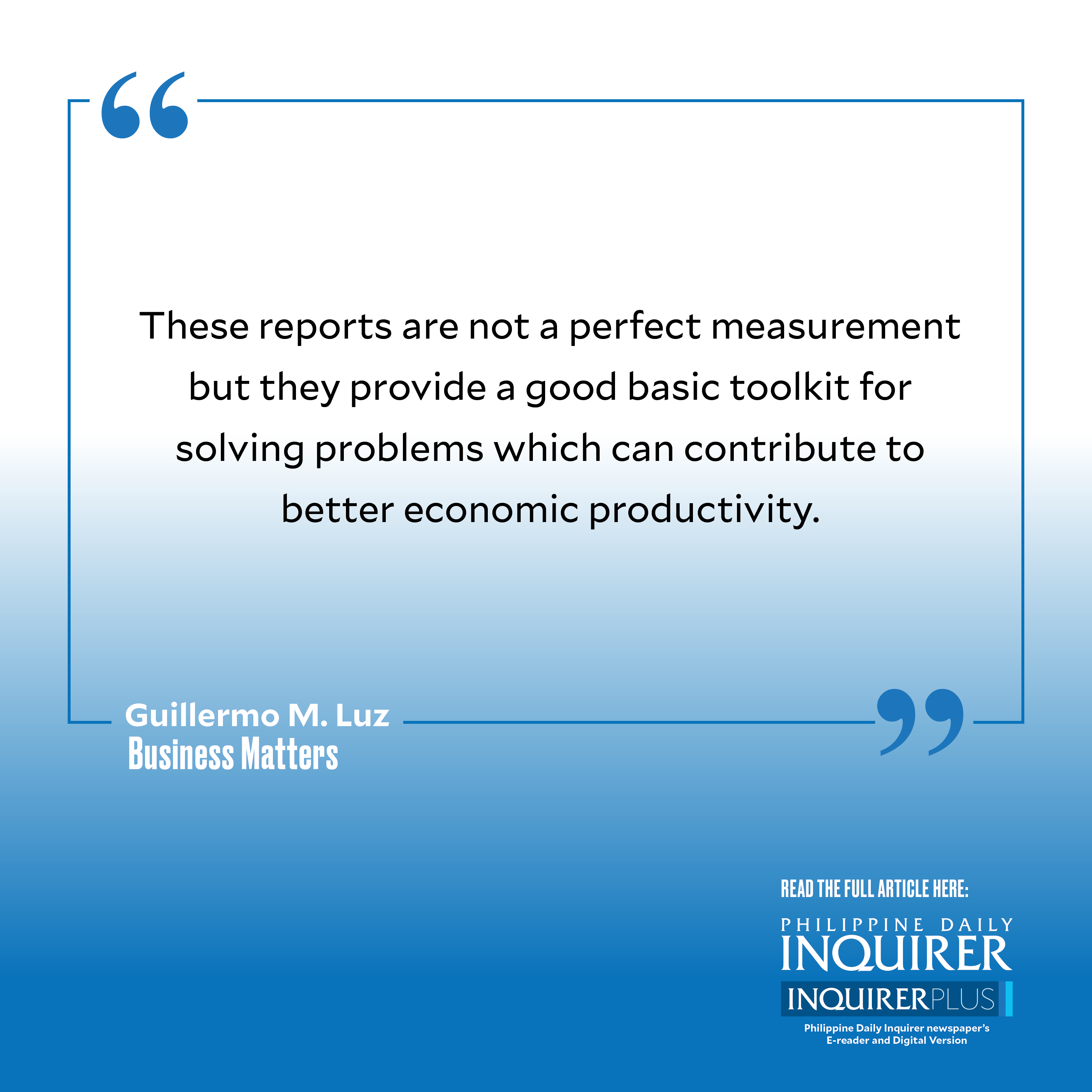The need to track our global competitiveness

A few weeks ago, the World Competitiveness Yearbook (WCY) results were released but seemed to be barely noticed nor did it cause a ripple in public. As far as I can remember, only one newspaper made it front page news. Let me try to summarize the results.
The World Competitiveness Yearbook is prepared every year by the International Institute for Development Management in Switzerland. It reviews data from 64 countries and ranks these countries based on a scoring system from zero to 100, with 100 representing the best scores. Rankings are based on scores achieved across four pillars: economic performance, government efficiency, business efficiency, and infrastructure. The WCY is one of 12 global competitiveness reports which the National Competitiveness Council used to regularly monitor from 2011 to 2018 (when it was dissolved).
How did the Philippines do in the 2023 report? The country ranked 52nd out of the 64 countries measured. This was four positions lower than last year. The Philippines’ best performance was back in 2013 when it ranked 38th out of a larger base of countries reviewed.
More alarmingly, the Philippines ranked 13th out of 14 countries covered in the Asia-Pacific, beating only Mongolia and performing well below its Asean peers covered in the report (e.g., Singapore, Malaysia, Thailand, and Indonesia). This has been the pattern for the last several years.
Among the four pillars, the country improved its ranking only in economic performance (from No. 53 to No. 40) but dropped in government efficiency (48 to 52), business efficiency (39 to 40), and infrastructure (57 to 58).
The economic performance pillar basically is a macroeconomic evaluation of the domestic economy while government efficiency measures the extent to which government policies are conducive to competitiveness. Business efficiency measures how the national environment encourages enterprises to perform in an innovative, profitable, and responsible manner while infrastructure measures how basic, technological, scientific, and human resources meet the needs of business.
One of the benefits of these reports is that it is easy to spot strengths and weaknesses. For instance, on the economic performance front, an obvious strength was in real GDP growth where the country ranked 6th, coming off a strong year after COVID lockdowns. However, a glaring weakness was in GDP per capita, where we ranked 62nd out of 64.
Under government efficiency, we ranked high (24th) in central bank policy but low in start-up procedures at 63rd (which seemed to use outdated data as the World Bank’s ease of doing business report has not been released for at least two years following its suspension). Bribery/corruption and tax evasion both ranked 59th.
Under business efficiency, our long-term employment growth is ranked high (1st!), probably owing to our large population and growth rates. But note that overall productivity and labor productivity both ranked very low (61st). And access to financial services ranked 60th.
In infrastructure, high-tech exports and mobile phone costs ranked 2nd while renewable energy ranked 9th. On the opposite end of the spectrum, medical assistance ranked 64th (dead last, pardon the pun), secure internet servers and communications technology both at 63rd, and universal health-care coverage index at 61st.
These reports are not a perfect measurement but they provide a good basic toolkit for solving problems which can contribute to better economic productivity. And since there are many different indices, it makes sense to track a range of them in order to monitor our problems or challenges as well as progression or deterioration in performance.
Since the National Competitiveness Council was dissolved in 2018, the regular monitoring of global competitiveness reports has pretty well stopped with the exception of the World Competitiveness Yearbook (by the Asian Institute of Management’s Rizalino S. Navarro Policy Center on Competitiveness) and the ease of doing business report, now renamed the B-READY report (for Business Ready, coming soon in fourth quarter 2023) monitored by the Anti-Red Tape Authority or Arta.
I think it’s time we began monitoring more global competitiveness reports regularly so we truly know whether we are rising or falling versus our peers.
—————-
Guillermo M. Luz is chair of the Rizalino S. Navarro Policy Center on Competitiveness at the Asian Institute of Management and chair of Liveable Cities Challenge.
—————-
Business Matters is a project of the Makati Business Club (makatibusinessclub@mbc.com.ph).




















